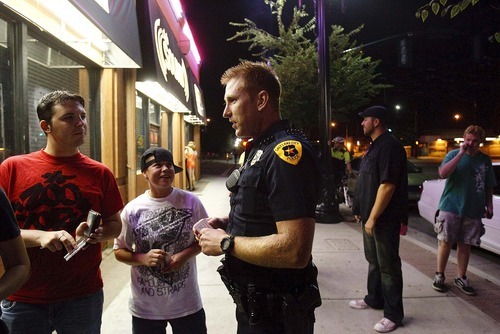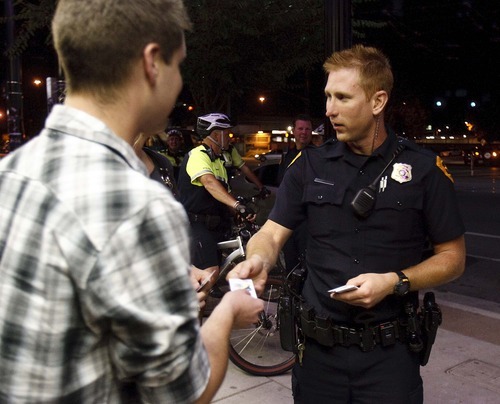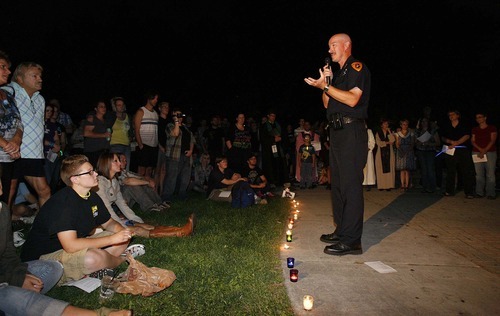This is an archived article that was published on sltrib.com in 2011, and information in the article may be outdated. It is provided only for personal research purposes and may not be reprinted.
The group was unmistakable.
Its leader wore deer antlers draped in tulle netting; a red, white and blue plaid shirt; and a pink tutu draped with a sheer, white petticoat.
Another man in a leopard print unitard stood near another in a sailor suit he insisted was a Scout outfit.
The seven men and one woman, calling themselves Strength in Numbers, waited Friday outside Club Sound's gay-themed dance night, escorting patrons to their cars.
The eight — a portion of the group's nearly 40 members — wanted to be outside the club where Dane Hall, an openly gay man, was attacked two weeks ago. The eight wanted to make sure no patrons walked alone or were being unsafe.
"There was so much emotion and anger about the whole situation," said Joshua Barnes, the group's organizer. "We were sitting around wondering what we could do. We decided to stick together in groups and make sure we're never alone. A bully mentality exists with hate crimes, people who commit them take on people who are weak and won't strike back. We wanted to show we are strong and ready to protect ourselves."
Both Bre Curtis and her twin brother, Braden Baugh — who is openly gay — joined "to take a stand against violence," Curtis said.
Her boyfriend's best friend, a straight man wearing the leopard-print unitard, echoed those sentiments.
"We don't want to see people we care about get hurt," Rich Howland said.
The Aug. 26 attack on Hall — which left him with a broken jaw and cheek bone after his attackers put his open mouth on a curb and stomped the back of his head — is still under investigation and has not been labeled a hate crime.
Salt Lake City Police Chief Chris Burbank was at Club Sound on Friday night along with several officers, passing out information about tip lines where people can report crimes or suspicious activities anonymously.
"The outreach we're doing is to let people know we have other avenues to give us information," he said.
Although the story of Hall's attack has spread, few people who witnessed the attack or have first-hand knowledge of the crime have come forward.
"We don't want to minimize this. Obviously something bad happened to Dane Hall," Burbank said. "But it's been very hard to say that this is a hate crime, which we take very seriously."
What's undeniable is the community's reaction.
Leaders hope the outpouring of emotion will further conversations about public safety and attitudes toward the lesbian, gay, bisexual and transgender community.
"Many of these youth have grown up in an environment of relative safety and don't know the fear of the past couple of weeks," said Michael Westley, a civil rights activist who serves on several LGBT committees and groups. "Regardless [of] whether the attack on Dane Hall was a hate crime, it's always an appropriate time to get that message out."
Valerie Larabee, executive director of the Utah Pride Center, says that although LGBT people feel safer coming out at younger ages, "there's still a high level of homophobia and bigotry."
She says that there have been cases like Hall's in the past, and there will be cases like his in the future.
"As a community we need to stand up and have conversation about who we want to be in Utah," she said.
Kenyon Farrow, a New York City writer and activist who will speak at the University of Utah's School of Social Work on Wednesday, says Strength in Numbers' approach is "an interesting solution" to addressing the safety issues.
"Members of the LGBT community, and allies as well, need to be thinking deeply about what are concrete steps to end homophobia and transphobia," he said. "Other LGBT organizations around the country have taken steps to do community education and organization. … They've done anti-homophobia work in other public settings that lead to ending those kinds of attacks because it changes people's responses to LGBT folks."
That's what Strength in Numbers hopes to do.
It's one of the reasons members bedeck themselves in goofy and outlandish clothing ("Who doesn't love to dress up?" Barnes asks.) while keeping one another safe. The garish costuming was intended to help people feel comfortable being themselves.
"There's no reason to be scared of being different," said Jonathan Nickle, who calls himself the Pink Avenger and wears a Che Guevara T-shirt, designer Dirk Bikkemberg combat boots and a fur jacket.
Most of the members of Strength in Numbers are in their 20s, and they have grown up in an environment much different from even a decade ago. Gay and lesbian people now host daily talk shows and the issues they may face are explored on popular shows such as "Glee." "There has been a lot of education and the conversation is more in the media about LGBT people and the issues that we face, but it always brings backlash," Farrow said. "While more young people are coming out, there's still homophobia and transphobia occurring. We still have a long way to go in terms of work to do."
Part of that work is coming from law enforcement.
Many in the LGBT community are wary of reporting crimes, particularly gay bashing, said Salt Lake City police Officer Kevin Stayner, an accident reconstructionist and openly gay man who serves on the Public Safety Pride Alliance. The group, formed in 2000, has police officers on it who are openly gay or transgender or who are straight allies.
Stayner recounted a case he handled recently where a young gay man had reported being robbed at Liberty Park. No one had actually robbed or attempted to rob the man. From interviewing the man, Stayner knew he had been gay bashed but wouldn't report it. "It's hard as a protector to see this go on and not be reported," Stayner said. "It can be intimidating dealing with law enforcement, but we want people to know police officers are ready to help."
He reminds people to take small, simple steps to stay safe: Walk in groups, park under streetlights and pay attention to surroundings. He also cautioned people not to become so inebriated or incapacitated they can't defend themselves.
"If you see something that's suspicious, it probably is. Call the police. We'll come check it out," he said.
The Pride Center's Larabee encourages the community as a whole to look out for one another.
"If we can band together, it will impact all of us," she said. "Utah has a lot to be proud of, and we have a lot of work left to do."
smcfarland@sltrib.com Twitter: @sheena5427 —
SLCPD confidential tip line
Call • Salt Lake City Police at 801-799-3000
Text • TIPSLCPD plus a confidential message or photo to CRIMES (274637) Does it get better? LGBT youth, suicides and what you can do
Who • Writer and activist Kenyon Farrow
When • 6-8 p.m. Wednesday
Where • Goodwill Humanitarian Building, 395 S. 1500 East, Community Meeting Room 155 —
Hundreds attend vigil
More than 200 people attended a fireside vigil on Friday evening to protest three assaults against gay men that have been reported in the past two weeks in Salt Lake City and American Fork.
Salt Lake City Police Chief Chris Burbank said police rely on the community to come forward when they witness or are victims of crimes. He cautioned against labeling the assaults, which are still being investigated, as hate crimes.
"Any crime represents a failure of our society, especially a crime like this. And [that's] not because of who he is or what he believes or the color of his skin — but the fact that he's one of us, he's a member of our community," Burbank said at Salt Lake City's Liberty Park.
City of Hope Salt Lake, a nondenominational church, organized the event, which drew members of diverse faiths from American Humanists to Mormons to call for greater acceptance of people who are lesbian, gay, bisexual or transgender (LGBT).
Rosemary Winters









